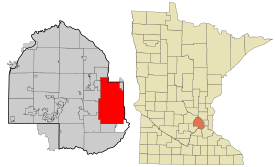Minneapolis
| Minneapolis, Minnesota | |||||
|---|---|---|---|---|---|
| City | |||||
| City of Minneapolis | |||||

Clockwise from Top-Left: Downtown Minneapolis at night, U.S. Bank Stadium, the skyline from Lake Nokomis, Minneapolis skyline and Minnehaha Falls.
|
|||||
|
|||||
| Nickname(s): "City of Lakes", "Mill City", "Twin Cities" (a nickname shared with Saint Paul), "Mini Apple", "First City of the West" | |||||
| Motto: En Avant (French: 'Forward') | |||||
 Location in Hennepin County and the U.S. state of Minnesota |
|||||
| Location in the United States | |||||
| Coordinates: 44°59′N 93°16′W / 44.983°N 93.267°WCoordinates: 44°59′N 93°16′W / 44.983°N 93.267°W | |||||
| Country | United States | ||||
| State | Minnesota | ||||
| County | Hennepin | ||||
| Incorporated | 1867 | ||||
| Founded by | John H. Stevens and Franklin Steele | ||||
| Named for | Dakota word mni meaning water with Greek polis for city | ||||
| Government | |||||
| • Type | Weak mayor–council | ||||
| • Body | Minneapolis City Council | ||||
| • Mayor | Betsy Hodges (DFL) | ||||
| Area | |||||
| • City | 58.4 sq mi (151.3 km2) | ||||
| • Land | 54.9 sq mi (142.2 km2) | ||||
| • Water | 3.5 sq mi (9.1 km2) | ||||
| Elevation | 830 ft (264 m) | ||||
| Population (2010) | |||||
| • City | 382,578 | ||||
| • Estimate (2015) | 410,939 | ||||
| • Rank |
US: 46th MN: 1st |
||||
| • Density | 7,485/sq mi (2,890/km2) | ||||
| • Metro | 3,524,583 (US: 16th) | ||||
| • Demonym | Minneapolitan | ||||
| Time zone | CST (UTC−6) | ||||
| • Summer (DST) | CDT (UTC−5) | ||||
| ZIP codes | 55401 – 55488 (range includes some zip codes which are for Minneapolis suburbs) | ||||
| Area code(s) | 612 | ||||
| FIPS code | 27-43000 | ||||
| GNIS feature ID | 0655030 | ||||
| Website | www.MinneapolisMN.gov | ||||
US: 46th
Minneapolis (![]() i/ˌmɪniˈæpəlɪs/) is the county seat of Hennepin County, and larger of the Twin Cities, the 16th-largest metropolitan area in the United States, containing about 3.5 million residents. As of 2015, Minneapolis is the largest city in the state of Minnesota and 46th-largest in the United States with a population of 410,939. Minneapolis and Saint Paul anchor the second-largest economic center in the Midwest, after Chicago.
i/ˌmɪniˈæpəlɪs/) is the county seat of Hennepin County, and larger of the Twin Cities, the 16th-largest metropolitan area in the United States, containing about 3.5 million residents. As of 2015, Minneapolis is the largest city in the state of Minnesota and 46th-largest in the United States with a population of 410,939. Minneapolis and Saint Paul anchor the second-largest economic center in the Midwest, after Chicago.
Minneapolis lies on both banks of the Mississippi River, just north of the river's confluence with the Minnesota River, and adjoins Saint Paul, the state's capital. The city is abundantly rich in water, with thirteen lakes, wetlands, the Mississippi River, creeks and waterfalls, many connected by parkways in the Chain of Lakes and the Grand Rounds National Scenic Byway. It was once the world's flour milling capital and a hub for timber. The city and surrounding region is the primary business center between Chicago and Seattle, with Minneapolis proper containing America's fifth-highest concentration of Fortune 500 companies. As an integral link to the global economy, Minneapolis is categorized as a global city. Noted for its strong music and performing arts scenes, Minneapolis is home to both the award-winning Guthrie Theater and the historic First Avenue nightclub. Reflecting the region's status as an epicenter of folk, funk, and alternative rock music, the city served as the launching pad for several of the 20th century's most influential musicians, including Bob Dylan and Prince.
...
Wikipedia



